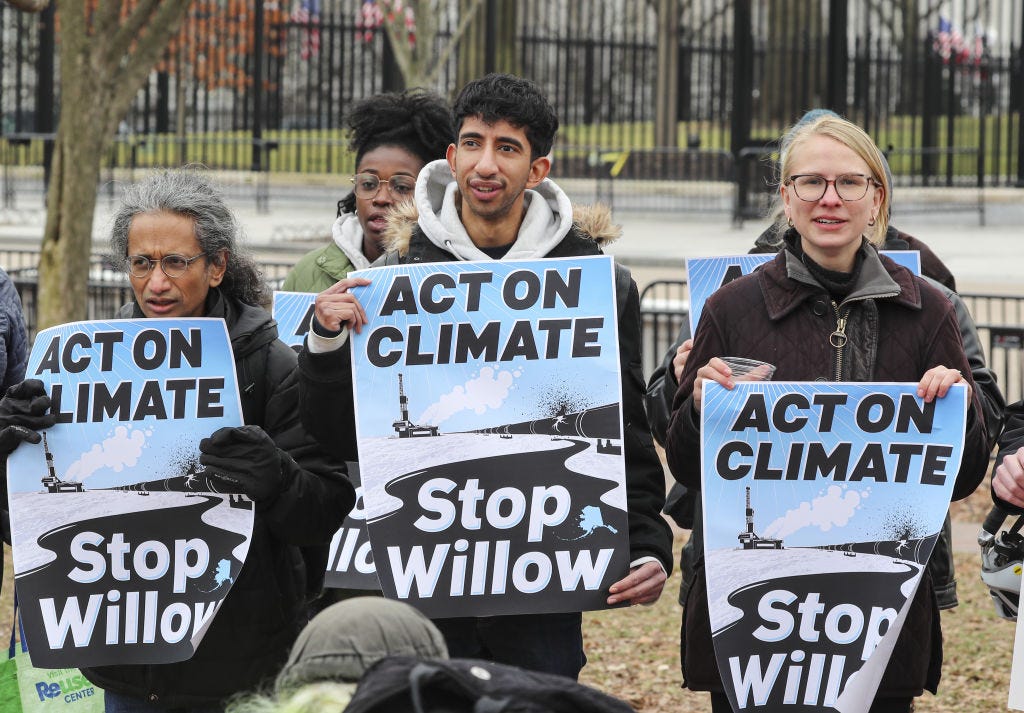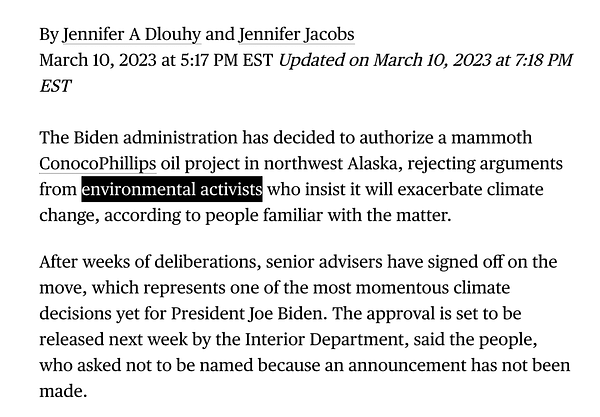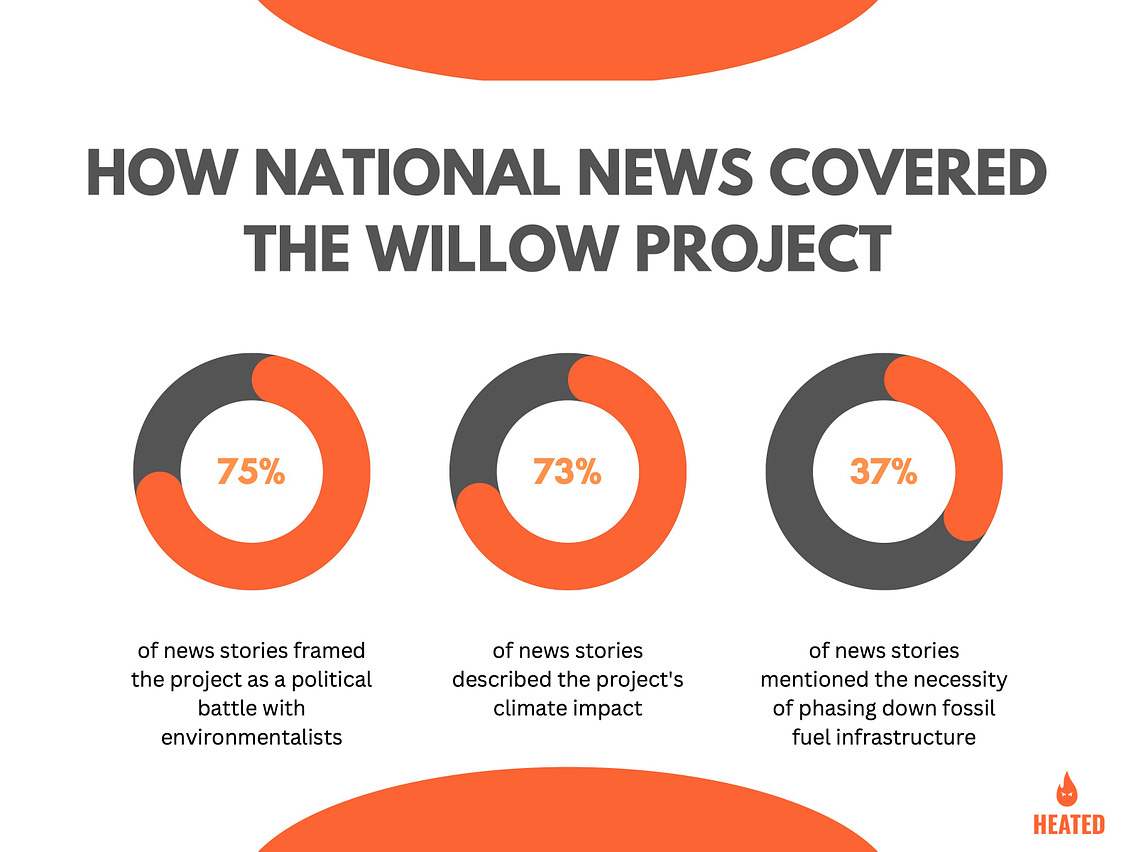Willow is not just an “environmentalist” concern
Welcome back to HEATED! Emily here. Arielle is in D.C. this week, so we’re working together in an office downtown. It’s super fun, and I think it makes our work better. But you can be the judge of that. Today’s post analyzes the mainstream media’s coverage of the Willow drilling project in Alaska. Its findings are a real testament to why independent climate media projects like ours are so important. We offer a perspective that’s truly unlike anything else you’re seeing in corporate-funded news. Willow is not just an “environmentalist” concernHEATED analyzed 30 national news stories about the Willow project and found that 75 percent framed its importance as primarily political.The Biden administration on Monday announced that it is approving the largest-ever proposed oil drilling project on U.S. public lands, in a direct repudiation of research warning that new fossil fuel development must cease to preserve a safe climate. The Interior Department approved ConocoPhillips Alaska's Willow project, located in one of the fastest-warming regions of the world. If completed, this project would produce the equivalent of an estimated 263 million tons of carbon dioxide over 30 years. This is about the same as building 20 new gas plants and running them for the same time period; burning 8.8 billion pounds of coal every year for 30 years; or adding 1.7 million cars to the road. Willow’s approval thus represents a significant threat to the global climate. According to the world’s top scientific authority on climate change, the IPCC, the world needs to achieve net zero emissions by 2050 to stabilize at safe levels of warming. Achieving that goal requires governments to stop approving new oil, gas and coal projects, according to the International Energy Agency. The Biden administration’s approval of Willow also represents a major violation of Biden’s campaign pledge to put the world on track to achieving net zero emissions by 2050. It also violates the spirit of the Paris agreement, which calls for nations to pursue efforts to prevent more than 1.5°C of global warming. In sum, the approval of Willow is a major story about the safety of all life on Earth, and the failure of one of the world’s most powerful leaders to protect the planet’s future. Most of the national media, however, did not take this approach when telling the story of Willow on Monday. How the national media has covered WillowWe were first alerted to a potential problem with national media coverage of Willow when we saw this tweet thread by Genevienve Guenther, the founder of End Climate Silence, an advocacy group seeking to increase climate coverage in news media.  I am just appalled by the media coverage of @POTUS's decision to approve the Willow oil drills in Alaska.
WHY is the framing "Biden vs the activists," when even the @IEA says that meeting the 1.5C target of the #ParisAgreement requires no new fossil energy development?
THREAD  Jennifer A. Dlouhy @jendlouhyhc In the thread, which has more than 700 retweets as of publication, Guenther complained that most early news coverage of Biden’s decision seemed to present the central conflict as political, rather than planetary.  First we have @jendlouhyhc @JenniferJJacobs, who broke the story, reporting that it's only "environmental activists" who "insist [Willow] will exacerbate climate change."
This is anti-science, verging on misinformation.
2/n As an example, Guenther highlighted the Bloomberg story that broke the news of Willow’s approval. Bloomberg’s story, she noted, attributed the project’s climate consequences to “environmental activists.” It also did not mention the IPCC’s warnings about the necessity of net zero by 2050; the IEA’s warnings against new fossil fuel infrastructure; or the pledges contained in the Paris agreement. This is something that happens a lot with big climate stories. To avoid the perception of bias, news outlets sometimes choose to highlight the political implications of a climate fight, rather than the actual climate implications. This choice can be legitimate, particularly if the publication is primarily politics-focused. But we know from experience that this choice is sometimes made because the political battle is more dramatic and easier to understand. And when it’s made too often by too many publications, it risks creating a news environment where readers understand the political importance of big climate fights, but not the actual importance for the planet they live on. So we decided to take a deeper look into Guenther’s claims to see if these choices are actually chronic. Here’s what we found. 75 percent of news stories frame Willow as politicalHEATED analyzed 30 national breaking news stories about the Willow project’s approval on Monday. We found that the majority—75 percent—framed the project’s importance primarily as political battle with environmentalists, as opposed to a planetary concern. Here’s a few examples of what that looked like:
The majority of the stories we analyzed—73 percent—did mention Willow’s potential consequences for the climate. But it was not generally a priority. On average, the discussion of climate impacts didn’t appear until the seventh paragraph. Here’s one of the better examples of a story describing Willow’s climate impacts:
We also found that, while 27 percent of news stories didn’t mention Willow’s effect on global warming, 100 percent of them included a paragraph on how many barrels of crude oil the Willow pipeline could produce. That is an unconscious prioritization of the oil project’s gains over the environment’s losses. Our analysis also found that only about one-third, or 37 percent, of stories about the Willow project mentioned the necessity of phasing down fossil fuels to achieve net zero emissions by 2050. And when that nod to fossil fuel climate impacts did come, on average, it appeared in the 10th paragraph—often near the end of the article. Here’s an example of where fossil fuel phase-out language was included, even though it was only in a single quote attributed to a researcher:
The news media’s systemic failure to mention the role of fossil fuels in a net zero future leaves out necessary information for readers to understand the stakes of Biden’s decision. While it may be unintentional, ignoring the research on how fossil fuel emissions accelerate global warming is a political decision–one made in favor of the fossil fuel industry. Shifting the way climate stories are toldObviously, ours is not a peer-reviewed scientific analysis. But we did put some careful thought into the news outlets we chose and the questions we asked. If you’d like to look at our analysis and/or check our work, our full spreadsheet is here. We also tried to be generous with our assessment. Even if an article only contained a vague mention of negative climate impacts, or even if it was contained within a quote, we gave it to them. We did the same thing for a mention of the phase-down of fossil fuels. Ultimately, the point of this analysis isn’t to call out individual reporters or even outlets, who are under immense pressure to turn around breaking news. The point is to understand what messages are being systematically repeated to the average reader, in the hopes that highlighting them on this scale might help shift the way climate stories are told. As we’ve said many times, journalism is essential to any effort to slow the climate crisis. On that note, here’s some journalism on the Willow project that we think is worth your time, after the subscribe prompt from Emily. Hi there! Emily here. As you probably know, HEATED is 100 percent reader-funded. That means our climate journalism is entirely free from the whims of corporate advertisers, venture capitalists, and rich foundations. Yay! HEATED’s climate journalism is unlike anything in the national corporate news media. Our perspective is valuable and unique, and I think today’s story shows that. Your support is essential for keeping us in the game. And of course, if that’s not in the cards for you, don’t fret. We appreciate each and every one of you. And if you’d like to support us non-financially, we always love a share. Now onto some links and a picture of a dog.
Further reading:
Catch of the Day: Today’s sweet doggo has a sweet (and sustainable) ride. Bunaka chases pavement with reader Greg, taking in the sights and thinking deep thoughts like, “How did we go from the tundra to this?” Want to see your furry (or non-furry!) friend in HEATED? Send a picture and some words to catchoftheday@heated.world. You're currently a free subscriber to HEATED. For the full experience, upgrade your subscription. |
Older messages
The hidden toll of climate disasters
Thursday, March 9, 2023
Most climate-related mental health challenges don't come from “doom-and-gloom” rhetoric. They come from climate change itself.
Growing our climate choir
Tuesday, March 7, 2023
Thanks to your support, HEATED is expanding its reach to nearly a half million climate-concerned people on Instagram.
The world promised to phase out fossil fuel subsidies. Instead, it doubled them.
Thursday, March 2, 2023
The sharp rise in fossil fuel subsidies is just one example of why activists say climate treaties are so often meaningless.
Do fossil fuels have a place in the net zero transition?
Thursday, February 23, 2023
In our first edition of Wormhole, Arielle dives into a question that kept coming up in our previous story.
This is what they call "essential for life"
Tuesday, February 21, 2023
The environmental disaster in East Palestine, Ohio has everything to do with our dependence on fossil fuels.
You Might Also Like
Meghan Markle Nailed The Easy Spring Outfit Of Our Dreams
Thursday, March 6, 2025
She met up with Serena Williams for a casual lunch date. The Zoe Report Daily The Zoe Report 3.5.2025 Meghan Markle Nailed The Easy Spring Outfit Of Our Dreams (Celebrity) Meghan Markle Nailed The Easy
What I Learned From a 30-Minute Recomp Workout
Wednesday, March 5, 2025
View in Browser Men's Health SHOP MVP EXCLUSIVES SUBSCRIBE What I Learned From a 30-Minute Recomp Workout What I Learned From a 30-Minute Recomp Workout Dr. Pat Davidson's 'Double-Deuce
What People Are Getting Wrong: Measles Myths
Wednesday, March 5, 2025
3 Roth IRA Rules to Know During Tax Season. It turns out that hosting "measles parties" is a bad idea. Not displaying correctly? View this newsletter online. TODAY'S FEATURED STORY What
‘My Friends Abandoned Me When They Had Kids’
Wednesday, March 5, 2025
Today in style, self, culture, and power. The Cut March 5, 2025 ADVICE 'My Friends Abandoned Me When They Had Kids' You need to pick one or two friendships and fight for them. The rest are
Sydney Sweeney Wore A Super Sparkly Dress With Cutouts After The Oscars
Wednesday, March 5, 2025
Plus, the hilarious Chelsea Handler, your daily horoscope, and more. Mar. 5, 2025 Bustle Daily Chelsea Handler shares four of her favorite books. Bustle ONE NIGHTSTAND Why Chelsea Handler Has No
The ultimate guide to instant noodles
Wednesday, March 5, 2025
Inside the closure of LA institution The Original Pantry Cafe
Save the Date for Poetry & the Creative Mind
Wednesday, March 5, 2025
Thursday, April 24, 2025 View this email in your browser Twitter Facebook Website Copyright © 2025 The Academy of American Poets, All rights reserved. You are receiving this email because you opted in
Is This The Best Serum For Dark Spots Yet?
Wednesday, March 5, 2025
According to Clinique, yes. Mar. 5, 2025 Bustle Daily Clinique's New Clinical Dark Spot Serum Is A New Era In Even Skin Presented by Clinique Clinique's New Clinical Dark Spot Serum Is A New
Win the ultimate bedroom makeover! Enter now!
Wednesday, March 5, 2025
The Sleep More Sweepstakes
Urbanism And Lent
Wednesday, March 5, 2025
Pleasurable things can also be constructive ͏ ͏ ͏ ͏ ͏ ͏ ͏ ͏ ͏ ͏ ͏ ͏ ͏ ͏ ͏ ͏ ͏ ͏ ͏ ͏ ͏ ͏ ͏ ͏ ͏ ͏ ͏ ͏ ͏ ͏ ͏ ͏ ͏ ͏ ͏ ͏ ͏ ͏ ͏ ͏ ͏ ͏ ͏ ͏ ͏ ͏ ͏ ͏ ͏ ͏ ͏ ͏ ͏ ͏ ͏ ͏ ͏ ͏ ͏ ͏ ͏ ͏ ͏ ͏ ͏ ͏ ͏ ͏ ͏ ͏ ͏ ͏ ͏ ͏ ͏ ͏ ͏ ͏ ͏




